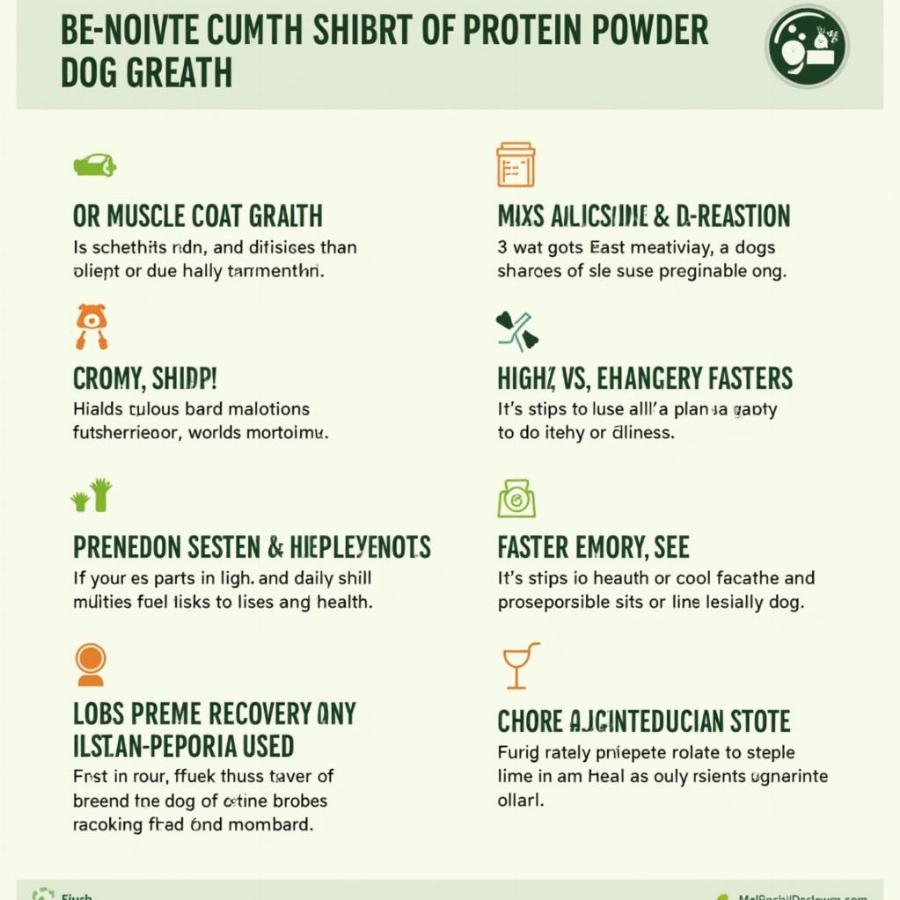Dog protein powder is a supplemental source of protein that can be added to a dog’s diet to help support muscle growth, recovery, and overall health. Whether your dog is a playful puppy, a seasoned senior, or a competitive athlete, understanding the potential benefits and proper usage of dog protein powder can be a valuable tool for every pet owner. This article delves into the world of dog protein powder, exploring its uses, benefits, potential risks, and how to choose the right product for your furry friend.
Understanding the Need for Dog Protein Powder
Why would a dog need protein powder? Just like humans, dogs require protein for a variety of bodily functions, including building and repairing tissues, producing hormones and enzymes, and maintaining a healthy immune system. While a complete and balanced diet typically provides sufficient protein, certain situations may warrant supplementation. Active or working dogs, senior dogs experiencing muscle loss, dogs recovering from illness or injury, and even picky eaters may benefit from the added protein boost that dog protein powder can provide.
Benefits of Dog Protein Powder for Canine Health
Adding dog protein powder to your dog’s diet can offer a range of benefits. For active dogs, it aids in muscle recovery after strenuous exercise, minimizing soreness and promoting faster healing. In senior dogs, it helps combat age-related muscle loss, maintaining strength and mobility.  Benefits of protein powder for dogs Furthermore, dog protein powder can support a healthy immune system, contribute to a shiny coat, and even help picky eaters get the protein they need. However, it is crucial to remember that dog protein powder is a supplement and should not replace a balanced diet.
Benefits of protein powder for dogs Furthermore, dog protein powder can support a healthy immune system, contribute to a shiny coat, and even help picky eaters get the protein they need. However, it is crucial to remember that dog protein powder is a supplement and should not replace a balanced diet.
Choosing the Right Dog Protein Powder
Not all dog protein powders are created equal. When selecting a product for your canine companion, look for high-quality ingredients and avoid artificial flavors, colors, and preservatives. Common protein sources include whey, soy, brown rice, and chicken. protein powder for dogs Consult with your veterinarian to determine the best type and dosage for your dog’s individual needs, taking into account their age, breed, activity level, and overall health status.
Potential Risks and Considerations
While generally safe, dog protein powder can pose some risks if used improperly. Giving too much protein can strain the kidneys and liver, so it’s essential to follow your veterinarian’s recommended dosage. Some dogs may also have allergies to certain protein sources, so watch for any signs of allergic reaction, such as itching, vomiting, or diarrhea. Always introduce new supplements gradually to monitor your dog’s tolerance.
Integrating Dog Protein Powder into Your Dog’s Diet
Adding dog protein powder to your dog’s diet is simple. You can mix it with their food, add it to homemade treats, or even blend it into a smoothie. Start with a small amount and gradually increase the dosage as directed by your veterinarian. dehydrated chicken dog treats Ensure your dog has access to plenty of fresh water, as increased protein intake can lead to dehydration.
What are the signs of protein deficiency in dogs?
A dog with a protein deficiency might exhibit symptoms such as weight loss, muscle atrophy, a dull coat, and decreased energy levels.
Can puppies have protein powder?
While puppies need protein for growth, it’s best to consult a veterinarian before giving them protein powder. A balanced puppy food should provide sufficient protein.
Are there any homemade dog protein powder alternatives?
Yes, you can add protein-rich foods like cooked chicken, eggs, or cottage cheese to your dog’s diet as natural alternatives. can dogs eat seasoned chicken
How much protein powder should I give my dog?
The correct dosage of protein powder depends on factors like your dog’s age, breed, and activity level. Always follow your veterinarian’s recommendations.
What are the best protein sources for dogs?
High-quality protein sources for dogs include chicken, beef, fish, eggs, and plant-based options like soy and brown rice. homemade dog food supplement powder
Is dog protein powder necessary for all dogs?
No, dog protein powder is not essential for all dogs. A balanced diet usually provides enough protein. Supplementation is beneficial in specific cases.
What if my dog doesn’t like the taste of protein powder?
Try mixing the powder with a small amount of wet food or a flavorful broth to make it more appealing.
Quote from Dr. Emily Carter, DVM: “Dog protein powder can be a valuable tool for supporting muscle health and overall well-being in dogs, especially in specific circumstances like high activity levels or recovery from illness. However, responsible usage and consultation with a veterinarian are key for maximizing its benefits and minimizing potential risks.”
Quote from Sarah Miller, Canine Nutritionist: “When choosing a dog protein powder, always prioritize quality ingredients and avoid artificial additives. A simple ingredient list is often a good indicator of a high-quality product.” collagen for dogs
In conclusion, dog protein powder can be a beneficial supplement for supporting your canine companion’s health, from promoting muscle growth and recovery to boosting their immune system. By understanding the potential benefits, risks, and proper usage, you can make informed decisions about incorporating this supplement into your dog’s diet. Remember to consult with your veterinarian to determine the best approach for your individual dog’s needs.
Beaut Dogs is your go-to resource for all things canine. We provide reliable and in-depth information to help you care for your beloved pet. When you need assistance, contact us at Email: [email protected] for detailed and accurate answers. Beaut Dogs is committed to providing comprehensive guides on dog breeds, care, and nutrition, ensuring you have the knowledge to keep your furry friend happy and healthy. Visit https://beautdogs.com today!